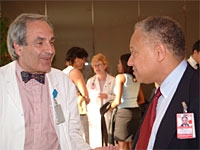
From left: Darlene Ramones, TSRF student; Giorgos Bidales, TSRF student; Daniel Yadaeger, TSRF clinical tutor; and Henry Cheng, TSRF clinical tutor.
A welcome reception for the participants of the Travelers Summer Research Fellowship (TSRF) Program, and other affiliated summer programs, was held in Weill Auditorium on June 26. Approximately 45 students from three summer programs, the Tri-Institutional MD-PhD Program's Gateways to the Laboratory Program; Weill Cornell Graduate School's ACCESS; and the Travelers Summer Research Fellowship Program for Premedical Minority Students, were welcomed by Dr. Bruce Ballard, associate dean for student affairs and equal opportunity programs and associate professor of clinical psychiatry. The event was also attended by TSRF program assistants, second-year medical students currently assisting Dr. Ballard in running the program; TSRF clinical tutors, fourth-year medical students who take the summer students on rounds in NewYork-Presbyterian Hospital to provide exposure to clinical aspects of medicine; a few Weill Cornell Medical College-Qatar students; and faculty sponsors.

From left: Dr. Lewis Drusin, professor of clinical medicine, and Dr. Bruce Ballard, associate dean for student affairs and equal opportunity programs.
The seven-week Travelers Summer Research Fellowship Program gives students the opportunity to spend four days per week working on a research project in the laboratory of the faculty sponsor, or in the offices of the faculty sponsor if the research is clinical. As of the summer of 2002, 816 minority students have participated in the program and an estimated 88 percent of summer minority fellows pursued an educational track to become physicians, a high percentage for an incentive program.
The Travelers Summer Research Fellowship Program, under the direction of Dr. Ballard since 1981, has contributed to the national effort to increase enrollment of underrepresented minority students in the nation's medical schools over its 35-year history. The program was developed out of the recognition that minorities were being denied access to the best education and entrance into professional ranks, including medicine. The summer program provides an opportunity to gain exposure to research, medical practice, and advice about how one pursues a career in medicine.

From left: Francoise Freyre, assistant dean of Weill Graduate School of Medical Sciences, and Elizabeth Wilson-Anstey, assistant dean for student affairs.
Weill Cornell Graduate School's ACCESS program trains underrepresented minority college students in the biomedical sciences. The program's goal is to foster an interest in biomedical research and education through hands-on basic research experience with Weill Cornell Graduate School faculty, at either the Medical College or Sloan-Kettering Institute laboratories. Students also participate in a seminar course in career opportunities for doctorates in the biomedical sciences.
The Tri-Institutional MD-PhD Program's Gateways to the Laboratory Program, currently celebrating its 10th anniversary, was the first program of its kind to train underrepresented minority students to become successful MD-PhD applicants. Students are given the opportunity to participate in independent research projects at Weill Medical College, The Rockefeller University, or Sloan-Kettering Institute; attend weekly journal clubs and clinical workshops; and participate in clinical rounds sponsored by NewYork-Presbyterian Hospital's Department of Medicine.
Photos by Amelia Panico.

